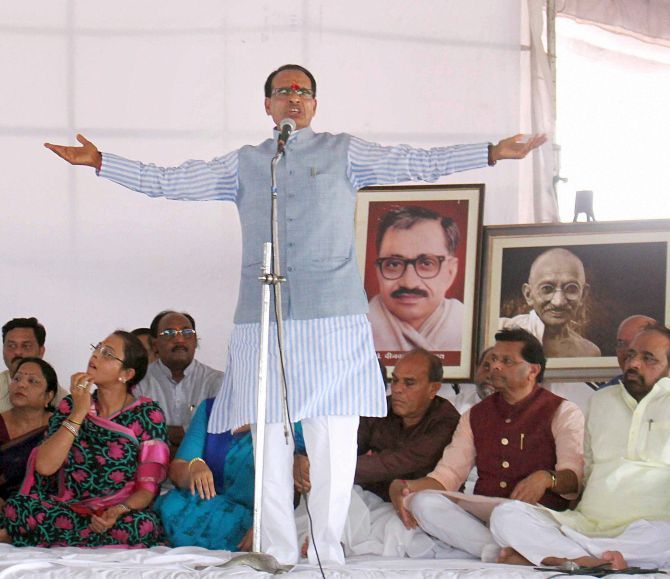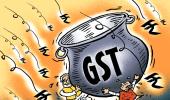The Great Agriculture Story that propelled Shivraj Singh Chouhan to power just won't sell any longer, says Aditi Phadnis.

Is anti-incumbency finally catching up with Madhya Pradesh Chief Minister Shivraj Singh Chouhan?
It is absolutely clear that the chief minister did not expect an attack from farmers -- the very constituency that he has taken so much trouble to nurture through his three terms as chief minister.
Farmers might be demonstrating on the streets now. But where would they have been had it not been for Chouhan, the CM's supporters ask indignantly.
On the other hand, it is also true that after seeing him in saddle for 12 years, people are bored of Chouhan.
A degree of complacency has crept into the system and Chouhan himself seems to have run out of ideas.
Combine that with extraordinary levels of corruption, especially in the lower reaches of the government, and you have in Chouhan a salutary lesson for other chief ministers: If you put all your eggs in one basket, the basket could break.
In Chouhan's case, it was the selling of the Great Agriculture Story that propelled him to power and could be instrumental in his downfall if he doesn't do something about it fast.
It began in 2006, eight months into his chief ministership.
Chouhan has strong agrarian roots, though his family was not wealthy.
In August 2006, he convened a panchayat of agriculturists and announced 40 or 50 decisions that would address specific problems of farmers.
Chief among them was the problem of capital farmers faced.
Agricultural loans in MP used to attract 16 per cent interest. Chouhan announced interest rates would be brought down.
They came down to nine per cent, then zero per cent and then, in 2015, he announced that crop loans would be given at a minus 10 per cent rate of interest to incentivise farmers to stick to agriculture even as prices began falling.
'There is no alternative to farming. We cannot grow our wheat, rice or chana in factories,' he said, justifying the decision.
No cooperative bank in Madhya Pradesh has failed so far.
But in a way, Madhya Pradesh became a victim of its own success.
Rural disposable incomes went up.
Expectations went up. But market forces were at work too.
In 2015 the state government withdrew the bonus it used to give to farmers for paddy, wheat and maize over and above the minimum support price (MSP) because there was overproduction of these crops in the state.
This was a result of Chouhan's aggressive backing to farmers to grow agricommodities, especially soyabean and wheat.
Madhya Pradesh grows more than 70 per cent of India's soyabean. But what is really lucrative is the export of de-oiled soya cake.
Soyabean has 40 per cent of protein content and 26 per cent oil content.
Once the oil has been removed, the high-protein residue, known as de-oiled soya, is an excellent source of animal and bird feed, and is in high demand in Argentina, Brazil, etc.
Because it is non-genetically modified, wary European buyers also buy it in large quantities.
The 'sharbati' wheat grown in the state is eyed greedily by other north Indian states such as Uttar Pradesh and Punjab because it is much more flavourful than the variety they grow.
Madhya Pradesh reported average agricultural growth rate of 13.9 per cent over the five-year period 2010 to 2015 -- delivering a cumulative growth of 92 per cent over the period.
While the national rate of growth of agriculture has hovered at around four per cent last year, MP's rate of agricultural growth was a staggering 18 per cent.
But if prices were crashing, who would buy all this grain?
Farmers in Madhya Pradesh are not talking about debt waivers: They want a better price for their commodities.
Chouhan came to Delhi, knocked on all the doors he knew. But who can help in a situation of glut?
What is more, forward traders are predicting de-oiled soya cake prices are going to fall further.
Even so, it was a body blow that the very people he had worked so hard to support could rise up against him.
Mistakes were made. The biggest was a firing on agitating farmers.
The second was taking his wife Sadhana along with him when he called on the families of farmers killed in the firing.
Why his wife? Why not a team of political people from MP and Delhi?
The third was sitting on fast to stop the farmers from agitating and breaking it 26 hours later: Did anything change for him to warrant breaking the fast?
Chouhan has to get his act together, and fast.
Madhya Pradesh needs another big idea to engage it -- and the Congress is waiting for him to make a few more mistakes.
IMAGE: Madhya Pradesh Chief Minister Shivraj Singh Chouhan during his fast at the BHEL Dussehra Ground in Bhopal. Photograph: PTI Photo











